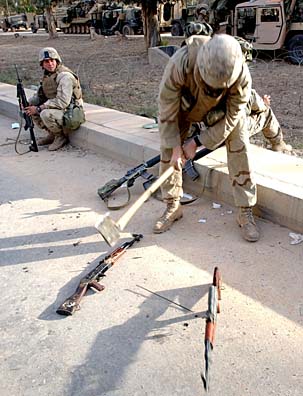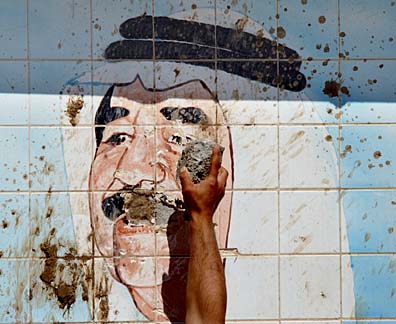
[ WAR IN IRAQ ]
ASSOCIATED PRESS
A U.S. Marine destroyed Iraqi rifles in Baghdad this morning. At right, Kurds smashed rocks into a portrait of Saddam Hussein in the now Kurdish-held village of Dibs, northern Iraq.
Opposition forces crumbled in northern Iraq on Thursday as U.S. and Kurdish troops seized oil-rich Kirkuk without a fight and held a second city within their grasp. U.S. commanders said signs pointed to a last stand by Iraqis in Saddam Hussein's birthplace of Tikrit. Kurds sweep into
northern Iraq, Bush
addresses IraqisBy David Espo
AP Special CorrespondentDespite the gains, one Marine was killed and 22 injured in a seven-hour battle in the Iraqi capital. Four more were wounded in a suicide bombing. "Baghdad's still an ugly place," said Maj. Gen. Gene Renuart.
Widespread looting persisted 24 hours after the city celebrated the regime's fall.
Increasingly, the U.S. military focus was away from the capital. Kurdish troops set off celebrations in Kirkuk when they moved in, and there were hopes that Iraqis would surrender in Mosul, another northern city, on Friday.
Nearly 100 miles to the north of Baghdad, U.S. commanders said Tikrit was the likely site of a last stand by Iraqi forces - if there is to be one. Iraqi defenders were believed to have moved there from other parts of the country. U.S. commandos were in the region, and warplanes were attacking.
U.S.-led fighters and bombers also hit Iraqi positions near the border with Syria, where special forces were trying to prevent regime loyalists from slipping out of Iraq and to keep foreign fighters from entering.
There were signs of difficulties ahead in efforts at building a new society.
ASSOCIATED PRESS
Kurds smashed rocks into a portrait of Saddam Hussein in the now Kurdish-held village of Dibs, northern Iraq.
Two Islamic clerics were hacked to death in Najaf by a furious crowd at one of Shiite Islam's holiest shrines, witnesses said.
One of the clerics killed, Haider al-Kadar, was a widely hated loyalist of Saddam, part of the Iraqi leader's ministry of religion. The other was Abdul Majid al-Khoei, a high-ranking Shiite cleric and son of one of the religion's most prominent spiritual leaders, who was persecuted by Saddam. They were killed at a meeting meant to serve as a model for reconciliation in post-Saddam Iraq. The U.S. military had flown in journalists aboard two helicopters to witness it, although they arrived after the violence.
An American plane beamed taped addresses by President Bush and British Prime Minister Tony Blair to the Iraqi people. "Your nation will soon be free," Bush said.
There was looting in Baghdad and elsewhere, in the wake of the disappearance of civilian authority. One senior Pentagon official said military commanders have asked religious leaders in the capital to help calm the populace and reduce the looting. One Marine commander said he would institute a dusk-to-dawn curfew.
Some Iraqis did what they could to prevent looting.
At al-Kindi hospital, medical students were sent into neighborhoods to retrieve medicine that had been taken on Wednesday. They returned with double-decker buses loaded with boxes of badly needed supplies.
In Washington, one administration official told Congress the Pentagon envisions parallel ministries run by Americans and Iraqis after the war until an interim government can be established. Paul Wolfowitz, deputy secretary of defense, offered no timetable for creation of the interim government or how long U.S. troops would remain in Iraq.
After three weeks of Operation Iraqi Freedom, Air Force Secretary James Roche told CNN: "We effectively have won the conflict. The regime is gone."
In northern Iraq, Lt. Col. Robert Waltemeyer, commander of a special forces unit, said troops would enter the city of Mosul "in a matter of hours or days."
Gen. Babakir Zebari, a Kurdish commander, said remnants of Saddam's Baath party and Iraqi military commanders in Mosul had offered to surrender on condition that the U.S.-led bombing stopped and they received amnesty.
Defense Secretary Donald H. Rumsfeld said at least some of the Iraqi forces inside the city had stacked their weapons in accordance with U.S. surrender demands. Waltemeyer said the U.S. military would meet with representatives from Mosul on Friday morning in an attempt to negotiate a surrender, although he said, "I'm not here to make deals."
Kurdish forces, which have battled Saddam for years, triggered celebrations in Kirkuk when they reached the city, an ancestral home and gateway to Iraq's northern oilfields.
In a scene reminiscent of downtown Baghdad a day earlier, joyous residents toppled a statue of the Iraqi leader, then stomped it and hit it with their shoes - a serious insult in the Arab world. The letters "USA" were spraypainted on the base of the statue.
Local residents cheered the passing Kurdish forces and pelted them with roses.
To the southeast, Kurdish peshmerga forces also moved into the city of Khaneqin near the border with Iran.
The city had been under a curfew for several days. But shortly after Iranian television broadcast images of Wednesday's developments in Baghdad, residents emerged from their homes and found Iraqi soldiers and Baath party members were gone.
The advances sparked alarm in Turkey, Iraq's neighbor to the north, which fears permanent Kurdish control over Kirkuk and nearby oil reserves. The Turkish government announced it was sending military observers to the city with U.S. approval.
American troops soon moved into the city, and Secretary of State Colin Powell told The Associated Press that Kurdish forces would pull back, reducing the likelihood that Turkish forces would enter the region.
The Bush and Blair addresses were part of a new information program that will include publication of a newspaper to be circulated in southern Iraq.
"The regime of Saddam Hussein is being removed from power and a long era of fear and cruelty is ending," Bush said, while Arabic subtitles scrolled across the screen.
Blair articulated similar themes. "Our enemy is Saddam and his regime, not the Iraqi people," he said.
While Bush, Blair and their commanders talked of a new life for Iraqis, Saddam's whereabouts remained unknown and there were fresh reminders that the war was not over.
U.S. forces in Baghdad battled holdout fighters for hours near the al-Azimyah Palace and a nearby mosque and Baath party official's house.
U.S. officials said they had been tipped off that senior Baath party leaders were meeting in the area, and the Iraqis opened fire first.
Hours later, a suicide blast injured four Marines shortly after dark in downtown Baghdad. No further details were available.
Half a world away, the victim of an earlier suicide bombing was laid to rest in Arlington National Cemetery outside Washington. Capt. Russell B. Rippetoe, an Army ranger from Arvada, Colo., became the first soldier from the Iraqi conflict to be buried on the historic grounds.
Hawaii military links and information

